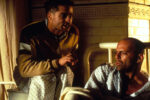An Interview with Terry Gilliam
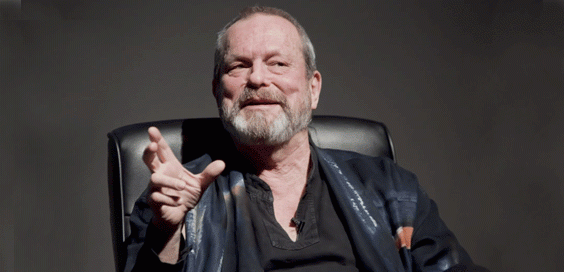
Monty Python animator and visionary filmmaker Terry Gilliam (Brazil, Time Bandits, The Fisher King, Twelve Monkeys) was presented with the Fellowship Award at this year’s Bradford International Film Festival.
Before he received his award he spoke to artistic director, Tony Earnshaw, about his career and inspirations, as well as the star-studded array of actors he’d worked with throughout his career.
Where do we start ? With Time Bandits?
How about with what’s written on my gravestone. You know what’s gonna be written on my gravestone? It’s gonna say, ‘He giggled in awe’. When I was promoting Brazil I was somewhere in Texas and I was on a radio show and somebody called in who’d seen the film and she said, (Southern Belle accent) ‘Mr. Gilliam, I have to say you made me giggle in awe.’ And I said, ‘I’ll write that on my gravestone’.
You have been here before, a long time ago. Do you want to recall that?
(jokingly) No, I’d rather not. It was terribly painful. We were young, we were foolish. We were taken advantage of by the people of this town. It was the first bit of filming we did for Monty Python, the first series.
“I had more freedom than others”
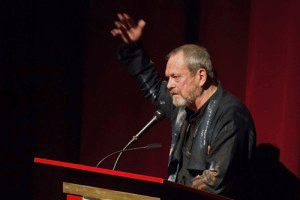 Were you aware all those years ago of the kind of impact Monty Python would have – or was it something a bunch of guys were throwing together and making up as you went along?
Were you aware all those years ago of the kind of impact Monty Python would have – or was it something a bunch of guys were throwing together and making up as you went along?
It wasn’t as thrown together as it appeared. So many people seemed to think we ad-libbed a lot but it was never – it was all written, it was very rigorous how we went about it. But we were in the wonderful position of being in total control of what we were doing, the six people. There were no executives, no agents, none of the baggage you acquire over the years saying, ‘Don’t do this’. it was very laissez-faire and we just did what made us laugh. The fact that other people found it funny as well wasn’t a surprise, but the fact that it has sustained itself as long as it has is unbelievable. (jokingly) It gives you a respect for humanity.
What was it that you put into the Python experience that made you all laugh – and how did that translate to audiences?
I was in the unique position of being the sole American and the animator and they were writing the sketches and I filled in between them. For me, I was in awe of them. I’d travelled halfway round the world and found a group of people that shared the same world view, the same sense of absurdity, but I couldn’t manipulate words and couldn’t perform as well as they do – I was doing my own thing. So in some way I had more freedom than the others because my stuff didn’t have to go through the vetting process. But I never try to analyse it, I really don’t – I just know it made me laugh.
Did you always have ambitions to be a filmmaker?
That was what I really wanted to do. I think somewhere in the latter stages of college I said I really wanted to do this. But I have no ability to make my way through a system. So I normally start at the top of something and make my way down (laughs).
You didn’t do a lot of acting (with Monty Python), although you were very, very good – and I wonder why? Were you never entirely comfortable acting?
I must admit I was inhibited by just how good they were. They could spin on a dime. All I could do was come in and do these odd bits and pieces. I enjoyed doing it but I just felt I was better at doing this other stuff. So that’s where my time was spent.
In-between the four Python movies you were able to do your first project as a solo Director, Jabberwocky. Why did you only use Michael Palin and Terry Jones for this – why not use the rest of them?
The others were too tall. They made me feel short and insignificant. They’d spent their lives honing that skill.
“I’m monomaniacal”
Michael said there was an Oxford/Cambridge divide in Python?
Totally. There was no question that the divide was always there. Mike, Terry and I are basically the same height and we’d play with conceptual things more than the others and on the Cambridge side there was much more aggression, whether that was passive aggression or not, it was always there. That’s where all those argument sketches, all that kind of behaviour came from the Cambridge side. We used to think it was left and right brain, basically.
Do you work on each project at a time and, as each film finished, you moved on to the next?
I’m monomaniacal in that sense. It’s one thing that possesses me and takes me over.
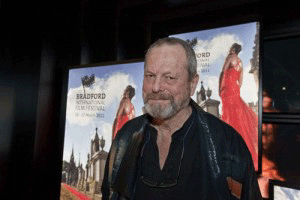 It’s a fairly ridiculous question, but where do your ideas come from? What inspires you?
It’s a fairly ridiculous question, but where do your ideas come from? What inspires you?
At night I put my shoes at the foot of the bed and I wake up in the morning and there’s little notes in there from elves that live in the skirting board in my house. But they haven’t been around lately, so I’m getting worried (laughs). Where do ideas come from? Robin Williams is a perfect example of what I think happens: I think there’s a platonic world of ideas and things and they’re floating in the air and if you have responding abilities things come to you.
Robin is one of those people that just thinks all the knowledge and ideas that people have ever known is just floating around and he can suck it in and he spews it out in the most wonderful combinations. I don’t know, I’ve never questioned it. I’m delighted that ideas come. Sometimes when I was with Python and I was short of ideas I’d go to the National Gallery and all these paintings and you’d start to have conversations with them; ideas just pop off like that.
“You have to deal with so much nonsense”
Did you have a vivid imagination as a kid?
Yeah. I seemed to be there from the beginning. My mother’s still got drawings. I would turn vacuum cleaners into monsters. I was always turning things into something else. It sounds horrible but I find the world inspirational. It’s all out there if you dare to look at it and take time to look at it.
Let’s talk about some of the actors you’ve worked with – Jeff Bridges, Robin Williams, Robert De Niro, Brad Pitt, Bruce Willis, Johnny Depp – Is there a difference working with, say, Jonathan Pryce, who has a stage background and Robert De Niro whose entire career has been played out on screen?
I just prefer English actors normally because so many American actors are method actors and you have to deal with so much nonsense – just go on and act, just say the words!
I think Brad Pitt’s performance in Twelve Monkeys is the best performance by an actor in any of your films.
Brad turned up in London and he wanted a part in the film but he wanted the part that Bruce Willis already had. The part in the film that Brad played is a fast part and, up until then, Brad hadn’t been know for his speedy delivery. But I’d seen him in Kalifornia and he’s a dangerous guy in Kalifornia and I thought, ‘Oh, maybe’. But he was so keen to do this I thought how can I turn a guy down who’s so determined? And I loved the idea of casting him against type completely. There’s a guy who I use for my movies and he’s a dialogue coach, although he’s a lot more than that, and I sent Brad to him and he said, ‘What are you doing to me? He’s got a lazy tongue, he smokes too much. He just can’t physically do this kind of work’. But Brad worked so hard from that point. He turned up on the first day of shooting and just went BANG! All day long he was in high tempo and at the end of the day he barely moved. But he was out to prove something. He’d just done Legends of the Fall and overnight he became the biggest thing out there. Before that we could walk down the street together, after that there was security everywhere, girls were threatening to throw themselves out of buildings; it was like The Beatles.
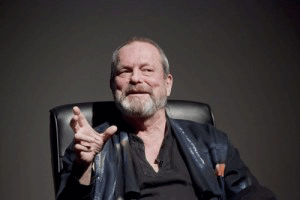 And Bruce Willis in Twelve Monkeys doesn’t try to grandstand Brad, he just lets him go.
And Bruce Willis in Twelve Monkeys doesn’t try to grandstand Brad, he just lets him go.
Bruce is very still and internalised. I think it’s Bruce’s best performance as well. It was overlooked I think because of Brad’s fireworks. It was interesting because Bruce went off to do two day’s shooting on Die Hard and when he came back he was a different guy – he was Bruce Willis, Superstar. It’s amazing how people change. It’s almost like a form of self-loathing – they’re being paid so much money – and they behave like assholes, frankly. In just two days back in that world he became an asshole. It took us the best part of a week to get him back down to the world that we were working in. It’s extraordinary to watch in Hollywood what success and fame does to people.
“A marketing ploy”
Do you have a favourite actor that you’ve worked with? Johnny Depp?
(jokingly) He’s Tim Burton’s friend now (laughs). Well Fear and Loathing in Las Vegas with Johnny was a joy because secretly he’s always wanted to be a Python and he was deeply into Hunter Thompson he could barely put a foot wrong – I mean he was Hunter Thompson.
Heath Ledger died during the making of The Imaginarium of Doctor Parnassus. I don’t want to pry but at what point in the proceedings did Heath die and when did you learn about that?
It was halfway through. We’d just finished shooting in London, I got up the next morning and went to Vancouver, Heath went to New York. I was in my art department trying to save fifteen hundred dollars and my daughter comes in and says, ‘Will you come in my office?’ And I say, ‘I’m busy’. She says, ‘Get in here!’ – and there it was on the BBC website: ‘Heath Ledger Dead’. It was clearly not possible. We were quite worried at that point about how Warner Brothers were trying to bury the existence of ‘Parnassus’ and we actually thought it was a marketing ploy. We sat there thinking this is not possible – we were together a couple of days ago. You start going into trance mode but it wouldn’t go away. It was real; he was dead. It’s hard to describe because he wasn’t just a fantastic actor he was part of a family. It was like a family member dying – and right in the middle of the film. The film-making side just fades away very quickly. You give up, basically.
Did you struggle with the two sides of your personality – on the one hand you’ve lost a friend, on the other hand you’ve got a film to finish?
No, mine was very simple – fu*k the film. It was over. Luckily I had my daughter in there and she’s foolish, she’s silly and she’s young and she said, ‘No, we finish this film.’ I said, ‘What are you talking about? Heath‘s dead, I don‘t even want to finish the film.’ Then it was like, we’ve got to finish it for Heath, blah, blah, blah. And my daughter said, ‘You’ve got to call Johnny.’ Johnny and Heath had become good friends and I was commiserating and he was commiserating and he said, ‘Whatever you need Terry, I’ll be there.’ He came to the rescue and that’s pretty extraordinary. He worked for nothing – all the money went to Heath’s daughter.



